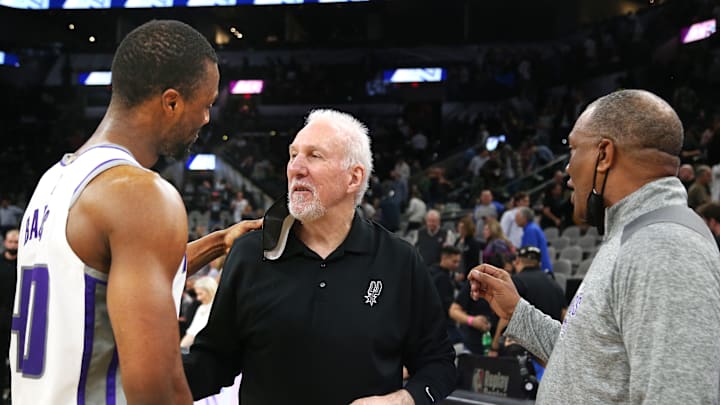Projecting Harrison Barnes's role after signing with the San Antonio Spurs this summer, fans will be able to draw parallels between him and a former Spur: Richard Jefferson. Though Jefferson’s time with the Spurs, from 2009 to 2011, had its ups and downs, both players share several similarities, including their athletic profiles, skill sets, and roles on the team.
However, while the comparison will be easy to see, Barnes brings a few key differences to the table that could make his tenure in San Antonio much smoother than Jefferson’s during his time in silver and black.
At first glance, the physical and positional similarities between Barnes and Jefferson stand out. Richard Jefferson, who came to the Spurs after averaging 19 points per game with the Milwaukee Bucks, was known for his athleticism, possessing an ability to knock down threes, and finishing at the rim.
Standing at 6'7" with a 7'0" wingspan, RJ was expected to be a versatile forward who could provide scoring while complementing Tim Duncan, Manu Ginobili and Tony Parker.
Harrison Barnes (32), though a few years older than Jefferson (29) was when he joined the Spurs, comes in with a similar profile. At 6'8" with a 6'11" wingspan, Barnes can stretch the floor, hit open threes, and finish in transition—attributes the Spurs desperately need after a year filled with offensive struggles.
Barnes will fit more seamlessly than Jefferson did with the Spurs
While Barnes wasn’t averaging 19 points per game in Sacramento like RJ was in Milwaukee, his role was different. The former Tar Heel has always been a complementary player, being drafted to Golden State, where he played alongside Steph Curry and Klay Thompson. Much like Jefferson, Barnes will see his role focused on knocking down open shots and providing reliable secondary scoring.
When Jefferson joined San Antonio, his points per game dipped significantly from 19 to 12 as he transitioned from a primary scoring option to a role player on a deep Spurs team. The same will be the case for Barnes, whose scoring is likely to stay around the 12-point mark, where he was last season.
That’s not a bad thing, though—it’s part of the expectation that comes with joining a team with multiple scoring threats and a strong system in place.
One area where Barnes may have a leg up on Jefferson is in his versatility. Barnes comes in with a more reliable midrange and post-up game than Jefferson had early in his Spurs tenure. By the time Jefferson’s three-year stint in San Antonio was over, he had developed a serviceable midrange jumper, but Barnes brings that aspect of his game from day one.
This should make him a more well-rounded offensive contributor and allow him to fit more seamlessly into the Spurs' half-court offense, which emphasizes ball movement and efficiency.
Jefferson struggled to fit into the Spurs’ system, which valued deliberate ball movement and half-court execution, whereas Jefferson had thrived in a faster-paced, run-and-gun style earlier in his career.
That misfit, combined with the fact that many fans felt he was overpaid for his production, led to frustration during his tenure. Barnes, on the other hand, has experience in systems that emphasize ball movement, such as Golden State and Sacramento, which should help him adapt quickly.
Additionally, his reputation as a professional and a good teammate may help ingratiate him with the fan base. RJ, on the other hand, has decided that taking shots at San Antonio is okay so that relationship is fractured.
Barnes, however, has always been known as one of the nicest guys in the league, someone who fits into any locker room and puts the team first. This aspect of Barnes’ personality could endear him to Spurs fans in ways Jefferson never managed.
While the comparisons between Harrison Barnes and Richard Jefferson are inevitable, the differences are just as important. Barnes’ experience, demeanor, and well-rounded game should allow him to succeed where Jefferson struggled.
